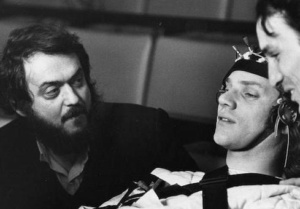First hitting cinemas back in 1972 Stanley Kubrick’s A Clockwork Orange has cemented itself as a cult classic but at the time it sent shockwaves through society in its disturbing depiction of ultra-violence, misogyny, vandalism and physiological torture, the likes of which had never been seen on the big screen before.
Adapted from the Anthony Burgesses novel of the same title A Clockwork Orange follows the life of young “Droog” Alex the leader of a rouge gang of youths in dystopian Britain. Excellently played by Malcom McDowell, Alex and his fellow delinquents high on “Milk Plus” go on a spat of criminal activities from brutal muggings to the savage rape of a woman. Yet not long into the film Alex is apprehended by ruthless authorities and he is soon forced to undergo a new radical type of reformative treatment which ‘cures’ him of evil thoughts and makes him into a perfect law-abating citizen. Released back into civilisation the “cured” Alex finds himself homeless and soon makes the shocking discovery that his old “Droogs” are now part of the corrupt law enforcement. After being badly beaten and tortured by them he soon finds himself at the mercy of one of his former victims. In a chilling final scene we see Alex in a hospital bed with the implication he has returned to his former state.
 One of modern cinemas’ most influential and controversial film makers, Stanley Kubrick’s stamp is all over A Clockwork Orange and it is up there among his finest work. The cinematography is sharp and evoking, with Kubrick choosing to shoot most of the film on handheld camera. This combined with the way he plays about with the camera speeds and the eye catchingly beautiful costumes and set designs, really help to convey the film’s dark tones and make the viewer feel part of this dystopian world. The film also utilises a juxtaposition between the cold imagery of the future with the classical music of Ludwig van Beethoven. Much like in Kubrick’s greatest cinematic triumph 2001: A Space Odyssey, the classical music and synthetic compassion help add a new layer to the dystopian landscape unfolding before our eyes.
One of modern cinemas’ most influential and controversial film makers, Stanley Kubrick’s stamp is all over A Clockwork Orange and it is up there among his finest work. The cinematography is sharp and evoking, with Kubrick choosing to shoot most of the film on handheld camera. This combined with the way he plays about with the camera speeds and the eye catchingly beautiful costumes and set designs, really help to convey the film’s dark tones and make the viewer feel part of this dystopian world. The film also utilises a juxtaposition between the cold imagery of the future with the classical music of Ludwig van Beethoven. Much like in Kubrick’s greatest cinematic triumph 2001: A Space Odyssey, the classical music and synthetic compassion help add a new layer to the dystopian landscape unfolding before our eyes.
What is truly remarkable about A Clockwork Orange, is the way that it has stood the test of time. Seeing it in its new 4K re-release, it’s as pungent as ever and I can’t help but feel that the bleak dystopia of Alex’s world is more comparable to today’s world than it was in the 1970s.
Yet, as brilliant as A Clockwork Orange remains it can make for somewhat difficult viewing, in its depictions of violence and rape. As uncomfortable as these scenes are to watch, the shock and offence caused is deliberately contrived. Kubrick is trying to make us think and feel disturbed in order to create irony and satire.
Despite its controversy it is important to acknowledge the films wide-reaching influence, not only did Kubrick’s ground breaking use of cinematography go on to influence the new wave cinema of the 1970s. The films bold portrayal of an “anti-hero” in Alex continues to influence popular culture to this day, with well-known characters like that of Hannibal Lecter and Tony Soprano taking after him. Almost 50 years on from when it’s initial realise Stanley Kubrick’s A Clockwork Orange continues to be a gripping and captivating thought experiment but more importantly it continues to be a cinematic masterpiece.
Director: Stanley Kubrick
Writers: Stanley Kubrick (screenplay), Anthony Burgess (novel)
Stars: Malcolm McDowell, Patrick Magee, Michael Bates
- David Lynch’s 1986 Blue Velvet (re-release) - 2nd July 2019
- Fleabag Series Two BBC - 13th April 2019
- Fleabag (BBC 2016 – …) Series Two Episode One - 12th March 2019










